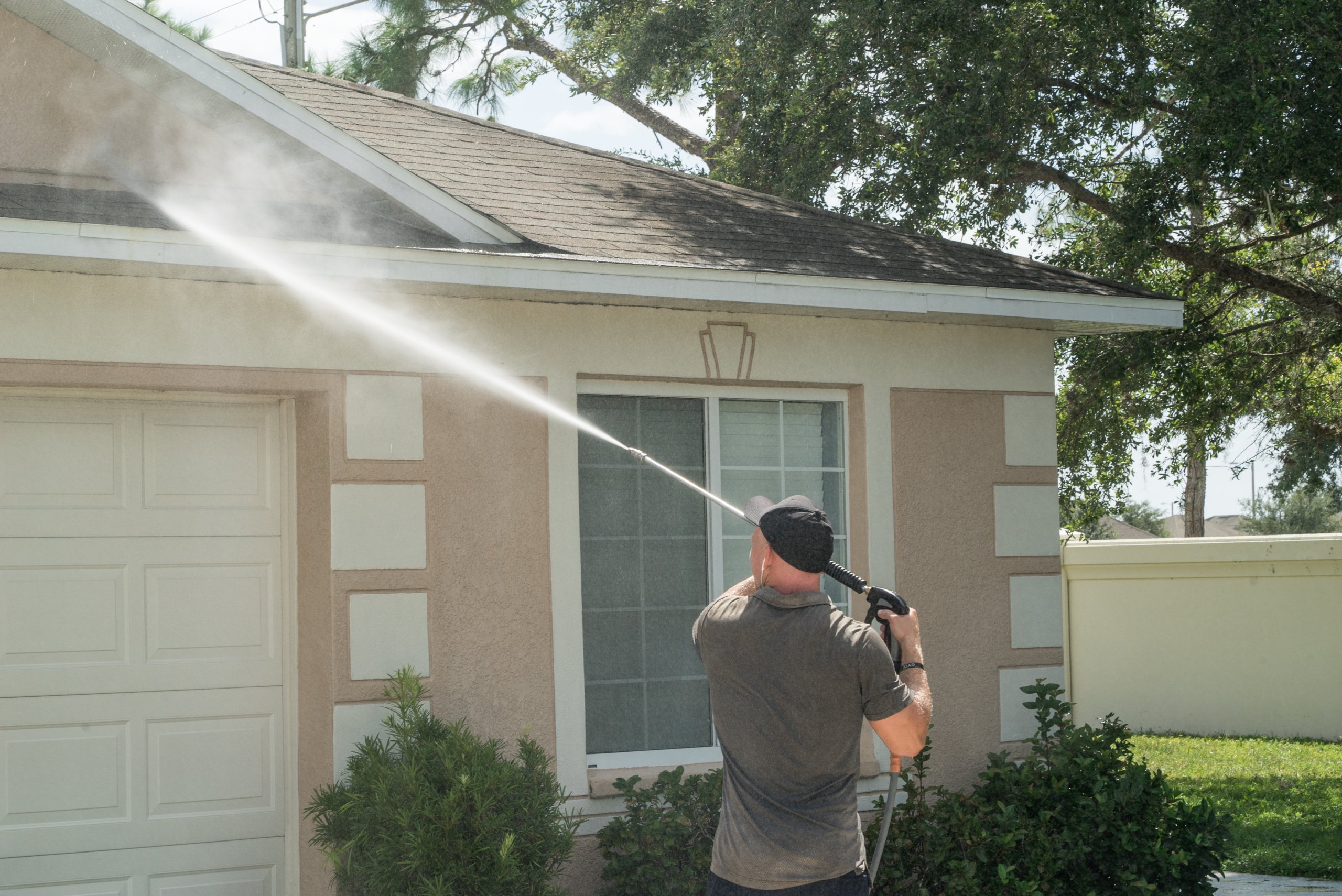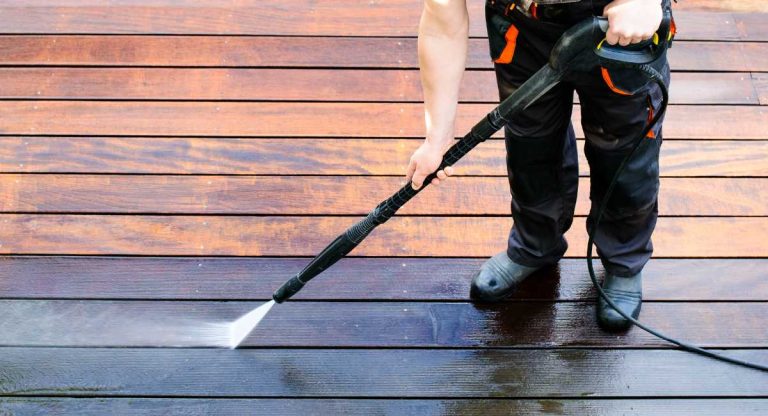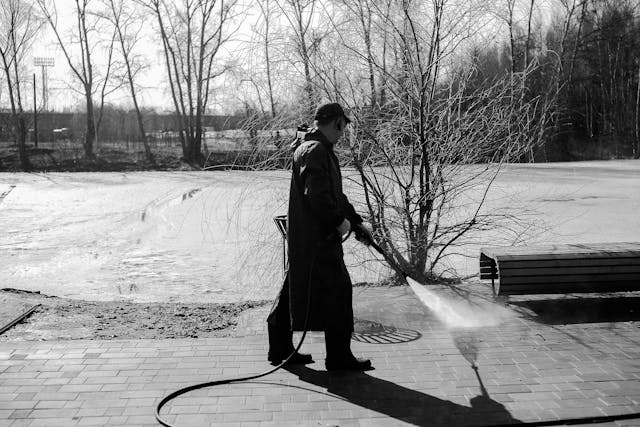
Power washing is not a one-size-fits-all service. Whether you’re a homeowner looking to clean your siding or a property manager responsible for a large commercial complex, your needs are quite different — and so are the services available to meet them.
Understanding the distinction between residential and commercial power washing can help you choose the right company, ensure proper techniques are used, and avoid overpaying (or underpaying) for services that don’t fit your project. Let’s break down the differences and what you should know before hiring a pro. 🔍🧼
🧱 Scope of the Job: Size Matters
The most obvious difference is the scale of the project.
🏠 Residential Power Washing
- Typically includes single-family homes, townhomes, and small structures
- Services might include cleaning siding, patios, decks, driveways, fences, and roofs
- Usually a one-day job or shorter
- Limited access needs (e.g., one home, one driveway)
🏢 Commercial Power Washing
- Involves larger properties like office buildings, shopping centers, parking garages, warehouses, etc.
- Often requires night or weekend scheduling to avoid disrupting business
- May require multiple crew members and heavy-duty equipment
- Projects may take several days to complete
In short: residential is about appearance and maintenance, while commercial is about scale, safety, and professional presentation.
💦 Equipment & Pressure Levels
Residential jobs typically use machines that output around 1,500 to 3,000 PSI, which is plenty strong for most home surfaces. These machines are easier to transport, quieter, and more maneuverable for working around landscaping or tight corners.
Commercial jobs often call for industrial-grade power washers, with higher pressure (up to 5,000 PSI), larger nozzles, and water recovery systems. These units can clean parking lots, industrial equipment, and warehouse walls at scale. Some may even require hot water systems or specialty detergents for grease removal.
Browse Amazon Here For Commercial Pressure Washers And Accessories
🧴 Cleaning Chemicals and Eco Compliance
While both types of services may use cleaning solutions, the chemical needs differ:
🌿 Residential Jobs
- Use gentle, biodegradable detergents for siding, decks, and roofs
- Soft washing techniques are more common to prevent damage
🧪 Commercial Jobs
- May require degreasers, solvents, or specific treatments (especially in restaurants or industrial zones)
- Must often comply with EPA and local water runoff regulations
Commercial power washing teams are more likely to carry equipment for wastewater recovery and filtration, which is often required by municipalities.
Browse Amazon Here For Popular Power Washing Detergents
📋 Licensing and Insurance Requirements
Both residential and commercial power washing services should be licensed and insured, but commercial jobs often require higher coverage levels, including:
- General liability limits of $1–5 million
- Workers’ compensation insurance
- Bonding
- OSHA compliance certification
Don’t be afraid to ask for proof. A professional contractor will have no problem sharing these documents, especially for larger jobs.
📆 Scheduling and Flexibility
Another major difference is when the work gets done.
🏠 Residential work is usually scheduled during regular hours, often when the homeowner is present.
🏢 Commercial work may need to be done:
- After business hours
- On weekends or holidays
- In tight windows of time (e.g., overnight cleans for retail storefronts)
Look for a company that offers flexible scheduling if you’re managing a commercial site — and be sure they have the staffing to pull it off. ⏰
🧑🔧 Specialization Matters
Just because a power washing company does a great job on a house doesn’t mean they’re equipped for a shopping mall. Likewise, a company that handles commercial buildings may be overkill (and overpriced) for a simple driveway job.
✅ Look for specialists:
- Residential companies often market to homeowners and may offer bundled services like window washing or gutter cleaning.
- Commercial providers focus on reliability, OSHA standards, and cost-effective scaling.
Make sure you’re hiring a provider that’s well-versed in your specific needs.
💰 Pricing Differences
Pricing structures also differ between the two:
💲 Residential Power Washing
- Usually charged by the hour, square footage, or flat fee (e.g., $250–$500 for full home exterior)
💲 Commercial Power Washing
- Often quoted as custom bids based on scope, square footage, access, waste recovery, and safety planning
- May involve longer contracts or ongoing service agreements
Expect commercial jobs to cost more — not because you’re being overcharged, but because more labor, gear, and prep are involved.
📸 Aesthetic vs. Compliance
Residential power washing focuses heavily on curb appeal: making your home look great, boosting value, and improving exterior cleanliness.
Commercial power washing is more about compliance and safety:
- Slippery oil on a sidewalk? Liability issue.
- Graffiti on a storefront? Brand image problem.
- Dirty warehouse floors? Employee hazard.
While the result is still clean surfaces, the motivation behind the cleaning differs.
🧽 Final Thoughts
Both residential and commercial power washing serve vital purposes — but they require different equipment, planning, and expertise. Knowing the difference helps you:
✅ Hire the right type of company
✅ Understand what to expect from the process
✅ Avoid overspending or underestimating the job
Whether you’re looking to freshen up your home’s siding or manage a multi-unit commercial property, choose a power washing service that matches your specific needs — and never be afraid to ask what kind of experience they have.
Browse Amazon Here For Commercial Pressure Washers And Accessories






